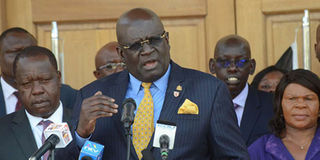Magoha must now shelve media theatrics and bring real change

Education Cabinet Secretary George Magoha addresses a press conference at Kenya Institute of Curriculum Development in Nairobi on March 28, 2019. He should publish a credible road map for the implementation of the new curriculum. PHOTO | FILE | NATION MEDIA GROUP
What you need to know:
- Policymakers must nurture a cool head to give strategic direction to planners, administrators and, if need be, a few teachers to act as peer champions.
- He may also want to review the criteria and process for promotion of teachers, which has everything to do with student life in schools.
The sight of Education Cabinet Secretary George Magoha struggling to fit into a desk designed for a Standard Two pupil nearly drove me to tears.
That I didn’t cry is not because his actions were not tear-jerking. In a country where the National Police Service pays Sh1.4 billion to ghost officers every year and Sh21 billion slips through the fingers of a battalion of Cabinet secretaries, principal secretaries, finance officers, auditors, accountants, Efficiency Monitoring Unit and Presidential Delivery Unit, crying is a waste of time.
It is becoming apparent that a disproportionate chunk of those supposed to steer this country are, by default or by design, determined to take it down.
I therefore implore Prof Magoha to change course and give Kenyans some real hope.
Coiling his massive self into a desk meant for seven-year-olds will not bequeath to Kenyans affordable, quality sustainable education and benefit from professional research.
SCHOOL VISITS
Policymakers must nurture a cool head to give strategic direction to planners, administrators and, if need be, a few teachers to act as peer champions.
Students are the teacher’s domain and CSs must be felt through stringent quality control and policy feedback systems that work.
Here’s why no Cabinet secretary should demonstrate he is a worker by pompously visiting schools.
The 2014 Basic Education Statistical Handbook by the Ministry of Education has the conservative count of early childhood education institutions and primary and secondly schools at 28,477, 28,362 and 8,625, respectively.
These are found from Kibera, Nairobi, to Nadapal on the border with South Sudan.
Visiting 10 per cent of these would require more than 10,000 days, or 27 years! The Cabinet secretary must therefore work on systems that will authoritatively supervise schools countrywide.
CURRICULUM
Fortunately, his ministry is one of those sectors with plenty of professionals to enable it play its part in Kenya’s long-term sustainable development goals and satisfy constitutional standards.
The Cabinet secretary should reserve his energy for re-engineering national polices and programmes in the ministry’s directorates, departments, agencies and institutions.
For starters, he should publish a credible road map for the implementation of the new curriculum.
Equally urgent is policy direction for the irrationally proliferated public universities, complete with a viable funding model and academic programmes that are relevant to students and add value to the economy.
Other areas include value-adding research into indiscipline and criminality in secondary schools.
SCHOOL RIOTS
When students started burning schools, their perspective should have formed the frame of reference. Why do dorms and classrooms symbolise oppression and suffering to them?
What needs to be said and done to evoke feelings of “home away from home” in these potential arsonists? Why have the supposed symbols of humble sojourn for knowledge hunters turned into objects of hate and violence?
Although it is arson and murder that catches the public eye, those in the system know that the extent of criminality in a significant number of our schools can no longer be sugar-coated or overlooked.
The CS needs to commission teams of sober educationists to research into the state of affairs that afford the opportunity for the crimes to thrive and propose viable school-level interventions.
WELFARE
He may also want to review the criteria and process for promotion of teachers, which has everything to do with student life in schools.
Finally, Prof Magoha has inherited a system whose many changes from the 8-4-4 days were forced down the throats of students, teachers and other stakeholders without regard to universally accepted standards of changing the system.
The value of an education system is its capacity to epitomise civilisation. If managed through threats, intrigues and intimidation, it becomes the direct opposite — the cradle of all that is primitive.
Prof Magoha has what it takes; however, he must shelve the media theatrics and settle down to some serious work.
Dr Mutegi is an education management and public policy expert and teaches at Kenyatta University. [email protected]




